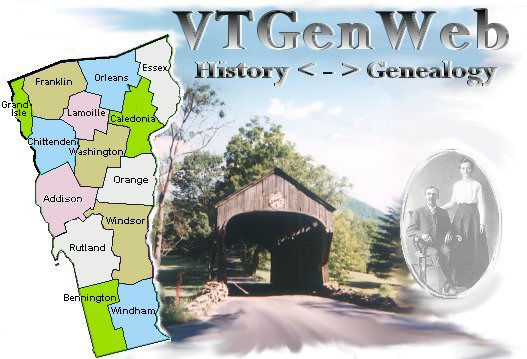 The USGenWeb® Project (c) 1996-2024 Last Updated 2024 |
Bennington County |
 |
 The USGenWeb® Project (c) 1996-2024 Last Updated 2024 |
Bennington County |
 |
 Bennington is the oldest county in Vermont still in existence, created
by the first general assembly on March 17, 1778. Vermont was organized
into two original counties, with Bennington in the west and Unity (a few
days later renamed Cumberland) in the east. On February 16, 1781 Rutland
County was created from Bennington County. On April 13, 1781 Bennington
gained the gore east of the town of Bromley (now Peru) from Windham and
Windsor Counties. Bennington is the oldest county in Vermont still in existence, created
by the first general assembly on March 17, 1778. Vermont was organized
into two original counties, with Bennington in the west and Unity (a few
days later renamed Cumberland) in the east. On February 16, 1781 Rutland
County was created from Bennington County. On April 13, 1781 Bennington
gained the gore east of the town of Bromley (now Peru) from Windham and
Windsor Counties.
From 26 June 1781 until 23 February 1782, Vermont attempted to annex part of New York east of the Hudson River (the so-called West Union); inhabitants in the area favored Vermont's township form of government, while Vermont hoped to gain bargaining power through expansion. New York did not lose control of the area. For almost seven months Bennington County overlapped part of Albany County, New York. On February 27, 1787 Windham County gained the town of Stratton from Bennington County. On 25 October 1805 Rutland County gained from the county when the town of Mount Tabor gained from the town of Peru. The county gained from Rutland County when the town of Dorset gained a small area from the town of Mount Tabor on November 17, 1825. ---Wikipedia Bennington County was named for Benning Wentworth, who was the Governor of New Hampshire from 1741 - 1766.. see ---Wikipedia
Born in Portsmouth, New Hampshire into a prominent colonial family in 1692, Wentworth was groomed by his father John while growing up to assume control over the family business before misbehavior while studying at Harvard College led him to be sent to Boston instead in 1715. There, Wentworth was apprenticed at his uncle's business before becoming a merchant. In 1730, he returned to Portsmouth to assume control over his father's estate. After Wentworth returned to his family, he soon started becoming involved in colonial politics, sitting on both the general assembly and the governor's council in the 1730's. There, he allied with Theodore Atkinson against political rivals Jonathan Belcher and Richard Waldron. In 1733, Spain refused to pay Wentworth for a timber shipment, leaving him in debt. Negotiations in London to resolve this led to Wentworth being appointed governor in 1741. Wentworth used his position as governor to entrench his family's economic and political dominance in New Hampshire. In the 1760's, a dispute with the colonial government in neighboring New York ultimately led to an end to Wentworth's land grants, and he eventually stepped down as governor in 1766. Wentworth soon retired to his mansion in Portsmouth, where he died four years later. The town of Bennington, Vermont was named in his honor. ***
ADJACENT COUNTIES: Rutland, VT | Windsor, VT | Windham, VT | Franklin, MA | Berkshire, MA | Rensselaer, NY | Washington, NY Thanks to USGenWebSites for server space © 1996 - present | Last updated 11 Feb 2024 |